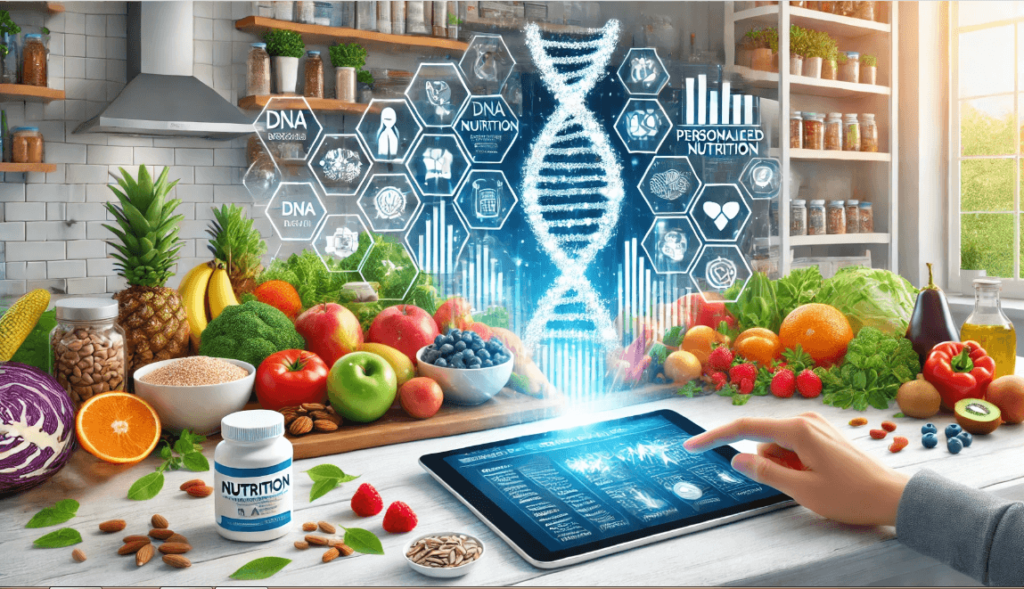
Personalized Nutrition: The Revolution in Health Care
Personalized nutrition is emerging as a revolutionary approach to improving health and well-being. Unlike generic diets, it considers each individual’s unique characteristics, such as genetics, lifestyle, nutritional needs, and even food preferences.
In this article, we’ll explore the main aspects of personalized nutrition, how it works, its benefits, and the expected outcomes.
What is Personalized Nutrition?
Personalized nutrition is a nutritional approach that aims to meet the specific needs of each individual. This methodology uses personal data to create dietary plans that optimize health, prevent diseases, and enhance physical and mental performance.
Types of Personalized Nutrition
- Genetics-Based
Through genetic testing, it is possible to identify predispositions to conditions such as obesity, food intolerances, and metabolic responses to certain nutrients. - Biomarker-Based Nutrition
Includes analysis of lab tests, such as cholesterol, blood sugar, and vitamin levels, to create plans focused on specific deficiencies and needs. - Lifestyle Monitoring
Considers habits such as exercise routines, stress levels, and meal timing to tailor the dietary plan. - Focus on Specific Conditions
Plans designed for individuals with chronic illnesses, food allergies, or specific goals, such as weight loss or muscle gain.
How Does Personalized Nutrition Work?
- Data Collection
The process begins by gathering information about health and personal history, including genetic tests, blood work, and lifestyle questionnaires. - Data Analysis
Professionals analyze the data to identify patterns, deficiencies, or predispositions. - Plan Development
Based on the analysis, a dietary plan is created with specific foods and nutrients to meet individual needs. - Monitoring and Adjustments
Continuous follow-up allows adjustments to the plan based on results and lifestyle changes.
Key Features of Personalized Nutrition
- Individualization: Each plan is unique, tailored exclusively to personal characteristics.
- Scientific Basis: Leverages advanced technology and detailed analysis for greater precision.
- Preventive Focus: Helps identify health risks before they manifest.
- Flexibility: Plans can be adjusted over time.
What Are the Effects of Personalized Nutrition?
By adopting personalized nutrition, you may experience effects such as:
- Improved energy levels and vitality.
- Reduced symptoms of chronic diseases, such as hypertension and diabetes.
- More efficient weight management.
- Strengthened immune system.
- Enhanced physical and mental performance.
Benefits of Personalized Nutrition
- Faster and More Effective Results: The specific approach avoids common pitfalls of generic diets.
- Disease Prevention: Reduces the risk of issues like obesity, high cholesterol, and nutritional deficiencies.
- Improved Quality of Life: Promotes long-lasting physical and mental well-being.
- Sustainability: Easier to maintain in the long term, as it respects food preferences.
When Does It Start to Show Results?
Results vary from person to person, but noticeable positive changes are often seen within weeks. Energy and vitality improvements tend to occur quickly, while effects such as weight control and better health indicators may take 2 to 3 months of consistent monitoring.
Consult a Health Professional
Personalized nutrition requires guidance from qualified specialists, such as nutritionists and doctors. Only professionals can interpret genetic tests, biomarkers, and design a plan that is safe and effective for you.
Conclusion
Personalized nutrition represents the future of healthy eating. With a science-based, individualized approach, it transforms the way we take care of our health, offering both immediate and long-term benefits. Invest in your health and well-being by consulting a professional to begin your personalized nutrition journey.
Why not start today? Your health will thank you!
Liked this content? Don’t stop here! Explore more amazing articles about health, wellness, healthy eating and supplements. Click here and continue learning how to take better care of yourself!






Leave a Reply